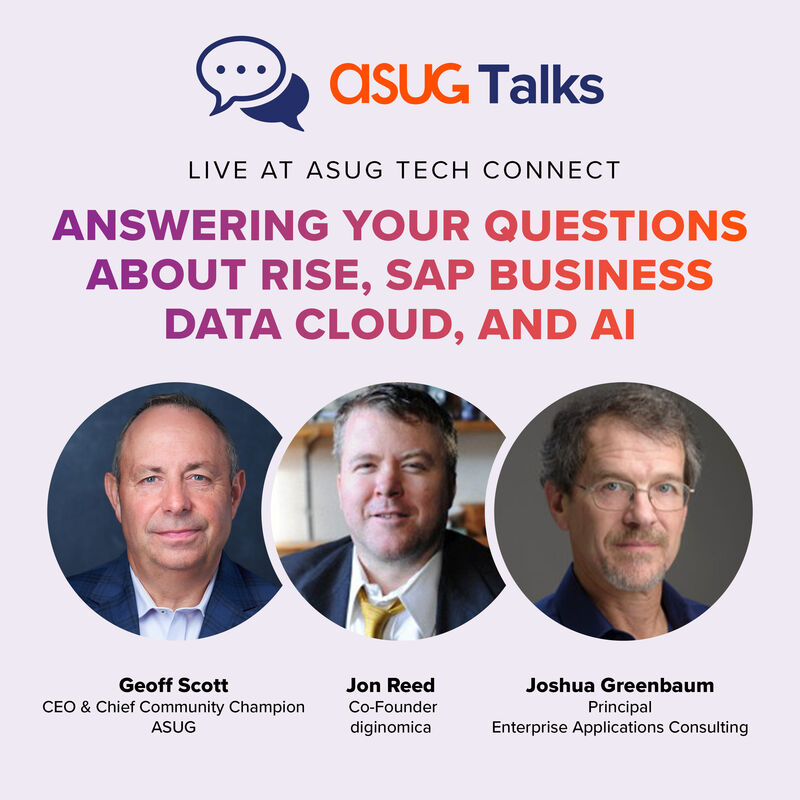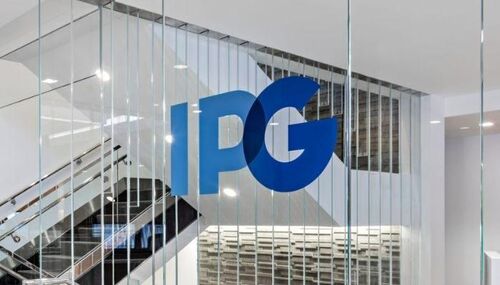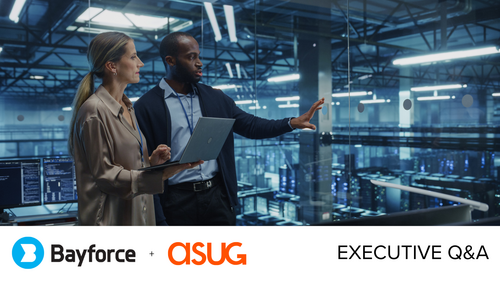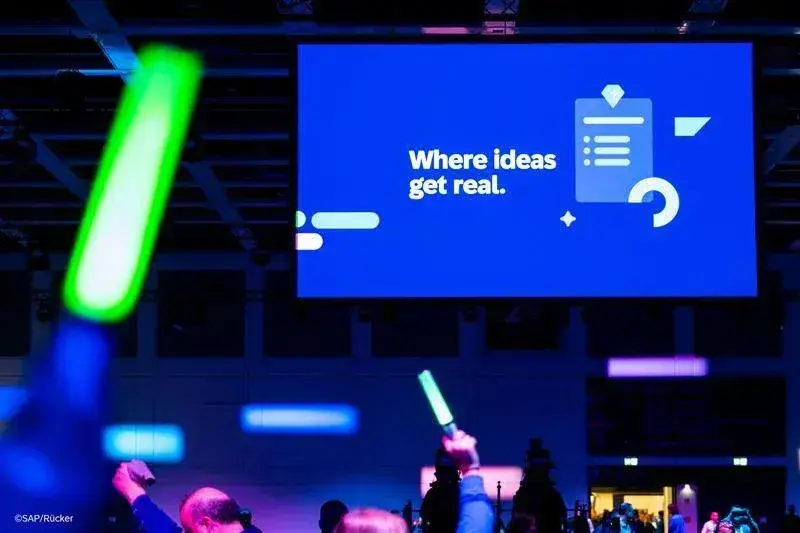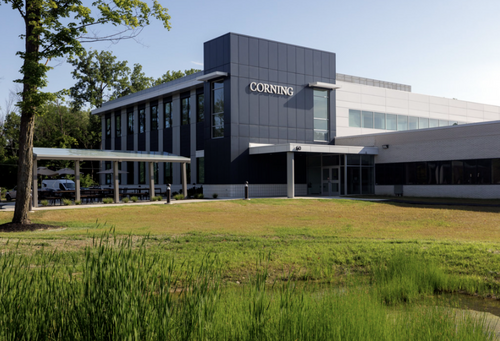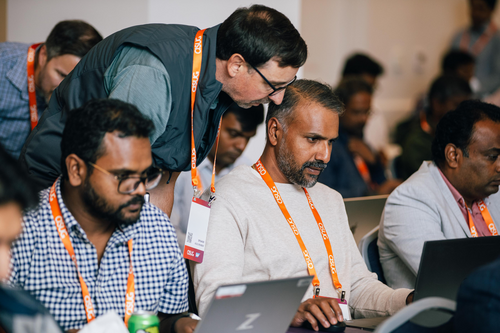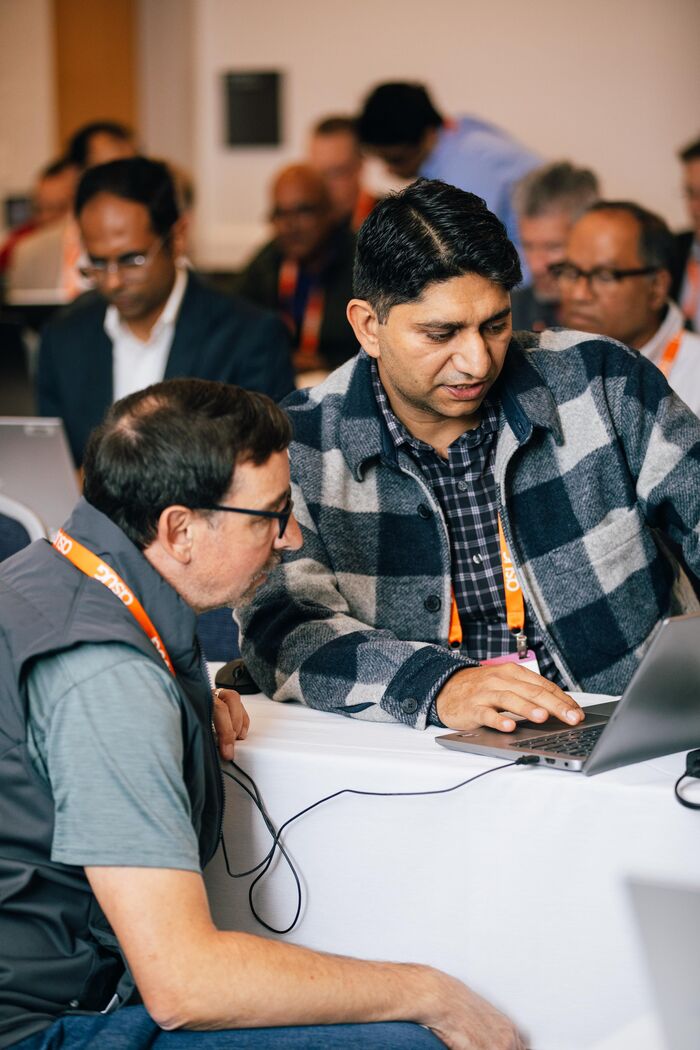Log in to save this article and keep your favorite resources in one place.
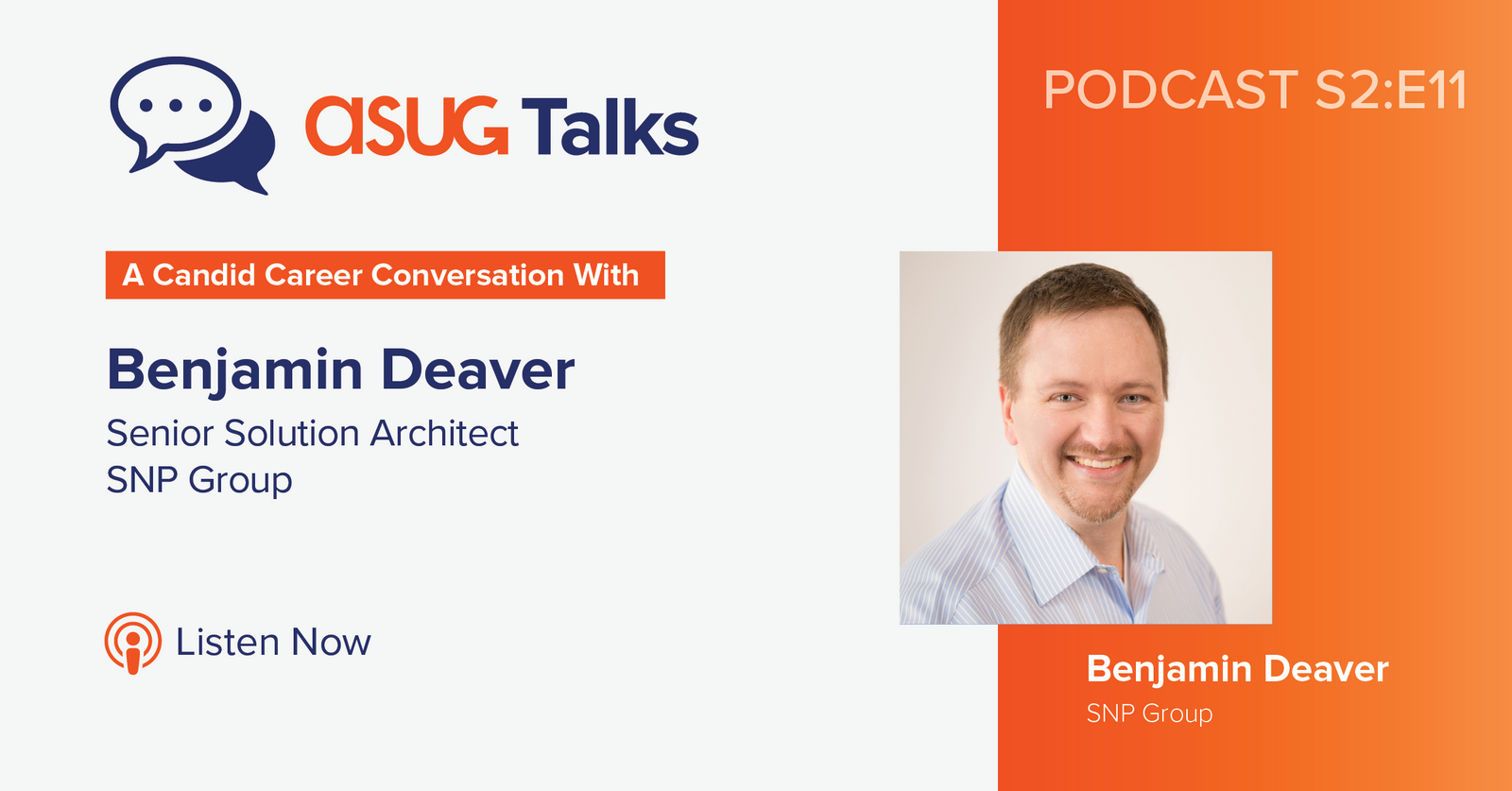
In this eleventh and final episode of ASUG Talks: Candid Career Conversations, season 2, we talk with Benjamin Deaver, Senior Solution Architect for SNP Group. A full transcript follows:
Laurel Nelson-Rowe:
Greetings everyone. We've got ASUG Talks: Candid Career Conversations starting up again today. Today's guest is Benjamin Deaver, who is a senior solution architect for the SNP Group. Thank you so much for joining us, Benjamin.
Benjamin Deaver:
Hey, thank you for having me here.
Nelson-Rowe:
We are going to get down to business right away, but we'll take a step back in your life. Where did you grow up? Tell us about that and did that shape the professional that you've become today?
Deaver:
I actually grew up all over the world. My father was career Air Force and so lived all over the United States and then had an opportunity to spend a lot of younger years actually in Southeast Asia. And did it affect who I became as a professional? Probably. I got exposed to a tremendous number of different cultures, different people. Got to pick up and move every three years and had an opportunity to reinvent. Really made the best of the situation. I like to think it influenced who I became.
Nelson-Rowe:
We will talk a little bit more and hear a little bit more about that through the course of our conversation, I'm sure. Tell us, did you always want a career in information technology?
Deaver:
No, definitely not, actually. Growing up there were two things that I always wanted to be, but like I said, I grew up in a military household and so growing up I always wanted to be a pilot for the Air Force. Can't tell from a podcast, but I'm 6' 2" and I'm wearing very, very thick contact lenses, both of which are things that stop you from being able to fly for the Air Force. Probably when I was in middle or beginning of high school was when I really started getting involved with technology and becoming fascinated with that, a natural progression, I think. It just continued on into university and helped me find my career path.
Nelson-Rowe:
What was the state of technology for you in high school?
Deaver:
The state of technology in high school. My first computer that I had access to was an Apple IIGS. That was maybe late middle school, maybe early high school. But my first real meaningful, actual, it was a 386DX that was released. I remember it had a whopping, we had a 20-megabit hard drive. It was the biggest thing on earth.
Nelson-Rowe:
We're going to fast-forward a little bit. Tell us about your first job related to IT and SAP solutions. When was that?
Deaver:
I got hired into an oil and gas company here in San Antonio, Texas, many, many years ago. It was based on a referral. I started my SAP career like many do; I was an ABAPer. I learned SAP from the code up. Immediately got involved with project teams. Immediately got involved with learning the underpinnings of how SAP worked. Then very quickly was able to start learning not just industry solutions and core ERP capabilities, but also branching out into other solutions, really getting into that data integration space very heavily, very early in my SAP career.
Nelson-Rowe:
Lovely use of acronyms there, which is the world of SAP and the world of IT, in general.
Deaver:
Absolutely.
Nelson-Rowe:
Do you consider yourself an active career path planner, responsive to career path opportunities that came your way, or something of a hybrid?
Deaver:
I'm going to go yes. I'm always trying to plan and scheme what the next step is going to be. That's just the nature of who I am. But I will tell you that many of the opportunities I've had in my career, my current role, as a matter of fact, was something that I got a phone call from somebody I've known and worked with for many, many years. It was one of those passive career opportunities that just fell out of the sky for me. I will actively plan the direction I want my career to go in, but I'm also always very open.
Nelson-Rowe:
Great. Tell us about that career path in two minutes or less. Tell us about your career highlights and share any pertinent details.
Deaver:
I graduated from a university here in San Antonio, Trinity University, back in the early 2000s. I actually worked outside of the SAP space to begin my career and then fell into SAP, again through my network and through a referral end. I almost immediately went into the consulting space. That's just my personality. I chase the difficult problems and if I find myself doing the same thing on a regular basis, I very quickly get bored with the situation. I don't want to be doing the same thing.
Consulting has been a very natural fit for me. I was independent for many years. I've worked with several different consulting firms. I probably spent seven or eight years with Accenture in their federal services practice. I'm currently solution architect, so I lead our solution architecture practice for SNP Transformations, which is a global leader in SAP data transformation and in integration, really SAP data management. Throughout my entire career, I've always been heavily invested in integrations, data management, every aspect of the data, the life cycle. That's just been a natural progression for me.
Nelson-Rowe:
What's been your favorite job, role, or responsibility to date? Why was that just a great favorite?
Deaver:
I really enjoyed my time at Accenture. It really taught me how to be a leader, an architect, how to develop people, and how to be a people manager. I really enjoy being able to lead people from the front. It taught me--on some very difficult to deliver projects--how to refine my skillsets in that area. That translated well into my role here at SNP where not only do I get to manage and develop groups of very talented people, but I also get to operate really at the forefront of data integration technology and transformation technology. It's the best of both worlds. I get to solve really complex problems for customers that are really interested in finding success, but then I also get to work with a lot of really smart people and help them refine their skillsets and just become better at what they do.
Nelson-Rowe:
You said you like to chase the most difficult problems. I might have entered the word most into that phrase. You like to chase difficult problems. What's been the most challenging role, responsibility, or the most difficult problem that you overcame to date and how'd you do that?
Deaver:
I would say it's usually having to do with integrating SAP data, getting it outside of the SAP ecosystem. SAP is really good at building walls around the data and making it difficult to be able to integrate that out to different non-SAP tool sets. It's not a knock against the product, it's how it operates. Being able to work with customers to be able to help them be able to get that core financial data that drives their business on a day-to-day basis.
You look at the numbers and it's like 95% of the world's commerce, at some point in its lifetime, will hit an SAP system. Being able to help integrate that out with non-traditional targets, whether it be some cloud data warehouse or the Lego blocks of data and analytics that exist in the major data clouds out in the ecosystem. Those are very challenging problems that when you have a track record of delivering solutions in that space, your customers really get excited about it. But again, you're chasing very difficult problems to solve and it's a lot of fun to solve those ones, specifically.
Nelson-Rowe:
Let's get back to your career for a moment again. What's been your best career decision to date? How did you go about that decision-making process and why was that best so far?
Deaver:
That's a good one. I've made a lot of career decisions and, at the time, every career decision seems like it's going to be the best one ever. Sometimes there's buyer's remorse, we'll put it that way. For me, it was definitely having the understanding with myself of what I wanted to do, having a real honest conversation with myself of what I wanted to do. I would say when I went to go and work for Accenture Federal Services, that was a great career decision for me because it allowed me to really jump wholeheartedly into the consulting space and really live in that space and get out of the customer side of the business. I was able to chase those difficult problems that kept me engaged. I was able to develop myself, continue to refine my skillset. But it also really solidified with me my personal understanding of what I want in my career because, like I said, I personally want to be in that consulting space and be the person that helps develop others and be the person that helps solve the very difficult problems.
I enjoy being tactically engaged that way. In my experience with my skillset, I had a very difficult time having that experience while working for customer implementations. It was my personal realization that what I really thrive upon, what keeps me most engaged, what makes me happiest with my role, is that I'm in that consulting space. I'm working with multiple different customers. They're not bringing us in to solve the really simple stuff. They're bringing us in because everybody's beating their head against a wall and they need help getting through it.
Nelson-Rowe:
Is there anything about your career, roles, responsibilities that you’ve had that you would like to do over? And if so, what, and why?
Deaver:
That's a very loaded question because are there things I wish I could do over? Absolutely. You think back on your career and you think to yourself, "If I'd just been paying attention. Or if I had just managed to get into that meeting. Or I'd met this person. Or I'd somehow been engaged in this thing." Hindsight's 20/20. The difference between the successful and the unsuccessful is that you're just improving the quality of the mistakes that you make.
We learn from the missteps. If you make the same mistake a thousand times in a row, you haven't learned anything, but if you make a thousand different mistakes, now you're a master. I'm not sure that I would trade out much in my career. There were certainly a couple of engagements that I was on where things didn't go well, or everybody's been on the project that turned into a death march and you're working 80, 100 hours a week to try to get something across the finish line. But the reality is, you learn how to manage projects and you learn how to manage to a schedule and you learn how to do things like say no by being in those engagements where everything goes off the rails. My fear is that if I traded any of those experiences in, I wouldn't be the person that I am today. Were there some unpleasant moments in my career to this point? Absolutely.
Nelson-Rowe:
Everybody's got them.
Deaver:
Everybody's got them. But, they help you get to where you are today. If you held me to an answer and said, "If I got to do something over why?" I probably would've jumped directly into consulting right out of university. I probably would've accelerated my trek to graduate school a little bit faster because I did learn a lot from those two engagements. I learned the most from the jump into consulting. And obviously trying to juggle that alongside of graduate school, I learned a ton about myself and the ecosystem and the networking. I would've accelerated those two paths a little bit and cut out some of the fluff. But beyond that, probably not too much.
Nelson-Rowe:
It's all valuable fluff.
Deaver:
Absolutely. I would've invested in Bitcoin when it was $5. That's what I would've done differently.
Nelson-Rowe:
I don't know that that's along your career trajectory,
Deaver:
Probably not. But, if I could do it over again.
Nelson-Rowe:
Has there ever been a job or a responsibility set that you wanted to have and didn't get?
Deaver:
When there was a lot of remote hiring that was taking place, especially during the height of the COVID pandemic, there were a lot of really pinnacle job opportunities that have historically resided in very specific geographies that were suddenly made available to people because you didn't have to be there. My wife and I, we have a Peloton, we've been huge fans of Peloton. I know a bunch of the folks who actually work and have worked at Peloton. There were some high-level architecture positions that came available over there. I threw my hat in the ring. The reality is my skillset was not a good match for what they were looking for. But, at the moment it seemed like a really cool opportunity and a neat thing to chase. Unfortunately, they realized that my background is entirely based on SAP and not necessarily streaming exercise data off of a bazillion devices. They caught on pretty quickly. That wasn't a good fit from their perspective. I did not get the opportunity.
Nelson-Rowe:
But, you're still riding Peloton anyway?
Deaver:
I am still riding Peloton anyway. My wife and I fight over the bike pretty much every morning.
Nelson-Rowe:
Have there been training education experiences that have proven essential to your success in your roles over time?
Deaver:
Training and education is what you make of it. I've sat in on some great trainings where I wasn't fully engaged and probably didn't take away as much as I needed to from the training. Yes, there's definitely been quite a bit. But, I think the greatest takeaway that I had from everything in my career up to this point around training and education is that it doesn't matter where you're at in your career, how much of an expert you think you are in anything, you always have the ability to cherry-pick. There's always going to be some new viewpoint or some nuance that you can pick up from anything that you're engaged with.
There's always an opportunity to learn something new. It's all about the attitude you bring to it. It's all about walking with an open mind and most importantly, being coachable. Some of the greatest training I've ever received was informal feedback from colleagues and peers that, if I hadn't really forced myself to have that coachable mindset, probably would've been lost on me.
Then I've had absolutely outstanding formal classroom-based training where I took a ton from it because, again, walked in with the right mindset and then I watched somebody sitting on either side of me not take nearly the same thing away because they had the mindset of, "Why do I have to be sitting here in this room?"
Nelson-Rowe:
The investment makes the difference.
Deaver:
It really does. The investment goes both ways. That's what I'm saying. You've got to approach every day as an opportunity to learn something. You've got to look at feedback as a gift. You've got to be coachable. You've got to be introspective. To that same point, you've also got to be willing to identify that sometimes you're going to get feedback from people who don't necessarily know what they're talking about, so you've also got to figure out how to filter the good advice from the bad. That's another interesting skill set to develop.
Nelson-Rowe:
Speaking of advice and coaching, have you had coaches or mentors that offered you advice and what was the most important pearls of wisdom that they shared?
Deaver:
Over my career, I've had a lot of coaches and mentors. I'm a big fan of asking people that are in my leadership chain or people that I know and respect to be able to give coaching and feedback sessions, so I actively try to seek out feedback. Probably the best advice I was ever given was early on in my career from somebody that I still speak to. He was the one who told me you've got to adapt and have that internal mindset of being coachable. Nobody wants to go out of their way to receive feedback that's telling me, "Hey, here's all the things that you're potentially not doing to the best of your ability." But, if you look at it from the perspective of somebody's helping you identify the areas where you've got growth potential, where you can do this, but you've got to look at it a slightly different way, and just receiving that first piece of feedback of always be coachable is probably the first step on that journey.
Nelson-Rowe:
Let's take another moment to reflect. In addition to the advice that you've heard, what are the three things that you've learned from being in IT and working in SAP that people should know when they're maybe coming into the field or considering the field?
Deaver:
There's a lot of advice that people are going to give you. I think the biggest piece of advice that I'm going to give people is make your career your own. It's easy to get caught up and say, "Hey, somebody told me I need to go and do this and then I'll be successful." This is the thing that you're going to be doing for the majority of the day, for the majority of your life. You've got to be happy and engaged and satisfied with what you're doing. It doesn't matter how awesome the role is, it's going to be miserable if you're not engaged and it's not something that you become passionate about. I was lucky. I was able to take a step back and look and be able to say, "I really like chasing down tough problems. I like solving those problems with people. I like building groups of people, bringing them together and attacking these things headlong and really just swinging for the fences on everything. I enjoy that."
Sitting at a desk and doing the same basic capability day in day out has so little appeal to me that, and like I said, I was very lucky that I had an opportunity to identify that early on. As far as pieces of career advice, figure out what it is that you want to do that drives your personal engagement, that makes you want to get up and be able to go and do this thing. Whatever that saying is, ‘Make your hobby your job, you'll never work a day in your life.’ I get up and I work hard every day. It's work. It's absolutely work. But it's work that I'm engaged in and passionate about. That makes it so much easier to be able to continue pushing forward because I do have that passion and that engagement around it.
Nelson-Rowe:
You've alluded to it, but really what's at the heart of that passionate day-to-day problem-solving mindset?
Deaver:
I'm a nerd. Deep down inside. Remember, I started my IT career as a backend AS/400i series developer on old school, small mainframes. I am absolutely a nerd at heart. Beyond that, I'm a data geek. For me, the thing that drove me to be able to really advance my career was playing with the new technology toys. I talk about SAP data integration with cloud targets, being able to get a whole bunch of financial data up into Azure and being able to play with Azure's analytics or Synapse as their cloud data warehouse or Snowflake or Databricks or any of these cool little tools that are out there. For me, the big driving factor is I'm a nerd. I want to play with the tools. I really know SAP data very well. When you marry those two things together, that's a very unique synergy that we get to bring to the table. What drives me there? What fundamentally pushes? I want to play with the cool new toys. I'm a kid at heart. I'm playing with Legos.
Nelson-Rowe:
Do you bring that to the dinner table every day as well?
Deaver:
I have a middle school daughter who keeps me in my place. She acknowledges that I'm a nerd, but nine times out of 10, she quashes that conversation before I get too far. My son engages a little bit more, but normally the conversation transitions to little league before I can really get too much of my passion out. But, don't worry, I’ve got plenty of coworkers I get to talk about it with all the time.
Nelson-Rowe:
Is there anything that you talk with them about in terms of difficulties? Or real difficult challenges about what you do on an everyday basis?
Deaver:
Absolutely. This is a personal style. I try to foster a very open and collaborative mindset with all of our different groups within the organization. My organization, it's co-located, not just across different regions in the U.S. but heavy presence within Eastern Europe, within Latin America, that we collaborate across those borders very effectively. The only way to be able to drive that collaboration is by having that open and honest conversation. Not just the successes, "Hey, we were able to deliver this huge success at this customer and this is how we did it, and here's the blueprint to recreate that success."
We have more conversations that are focused on, "Hey, I'm working with this customer and we're trying to do this thing. We are just beating our head against the wall and we need some help figuring out how to be able to accomplish this." I tell my team all the time, "All of us is a lot smarter than some of us, and so let's get together and let's talk through this stuff and figure out the best path forward." The solution is not to dance around the problem and pretend that it goes away. Problems tend not to go away on their own. The solution is to run at it head-long and start chipping away at it.
Nelson-Rowe:
If you had a direct channel to SAP and could tell the organization to change one thing or a couple of things in terms of their products and solutions, what might you ask them to do?
Deaver:
I think I would tell them to really take a moment and let's find a way to bring a lot of the products back together. Integration is the Achilles heel of any ecosystem. SAP products tend to integrate rather well with each other except for the ones that don't. Let's take a moment and step back and find those ones that don't necessarily integrate terribly well or the things that have been organically acquired and really spend the time being able to get those to integrate into the ecosystem a little more effectively.
Let's talk about standardizing some of the data models. Let's talk about finding ways to be able to make the data that's ostensibly the same between one system and another system. It has the same meaning, carries the same values, but the data model itself may be substantially different. Let's start rationalizing those paths a little bit.
Let's start focusing on the things that make it easier to run SAP long term for our customers so that we don't have to worry about people burning out and burning away from the platform. This is what we've dedicated our career to developing and supporting, so let's make it easier for the customers to continue on with this investment in their ecosystem.
Nelson-Rowe:
Okay, great. We've talked a lot about advice that you've gotten. I'd really like to hear three crisp pieces of advice that you'd either give to your son if he's contemplating IT and SAP or others definitely entering the field.
Deaver:
I would say be coachable. Never stop learning and be impossible to ignore.
Nelson-Rowe:
Put yourself out there.
Deaver:
Absolutely. The guy who's standing in the back of the room who doesn't raise his hand is never going to get called on.
Nelson-Rowe:
Great. Absolutely. It's time for ASUG Talks’ final question, which is our superpower question. If you could have one superpower to be better at your job and more successful in your career, what would that superpower be?
Deaver:
The superpower that I want is probably that I need to be able to stop time. I've gotten to the point where I've got enough things that are going on that I sometimes need to be able to step back. Being able to pause time for a moment, even if just to be able to reprioritize or think about the next thing that really needs to happen, would mean worlds to me. If I had the ability to stop time and be able to do stuff while time was stopped, that would be phenomenal.
Nelson-Rowe:
I think that's a double superpower.
Deaver:
I think it is. I'm trying not to get greedy here. But just being able to have a moment to be able to take a step back from the velocity with which we're moving on a daily basis and be able to reprioritize internally would be my superpower.
Nelson-Rowe:
Great. Thank you. Thank you for taking time out of your workday and your family time for a conversation for the benefit of the ASUG community and the larger IT and SAP community. We're really appreciative of your time and your attention and your conversation.
Deaver:
Thank you for having me. Really appreciate the opportunity and hopefully it's helpful to someone.
You Might Be Interested In
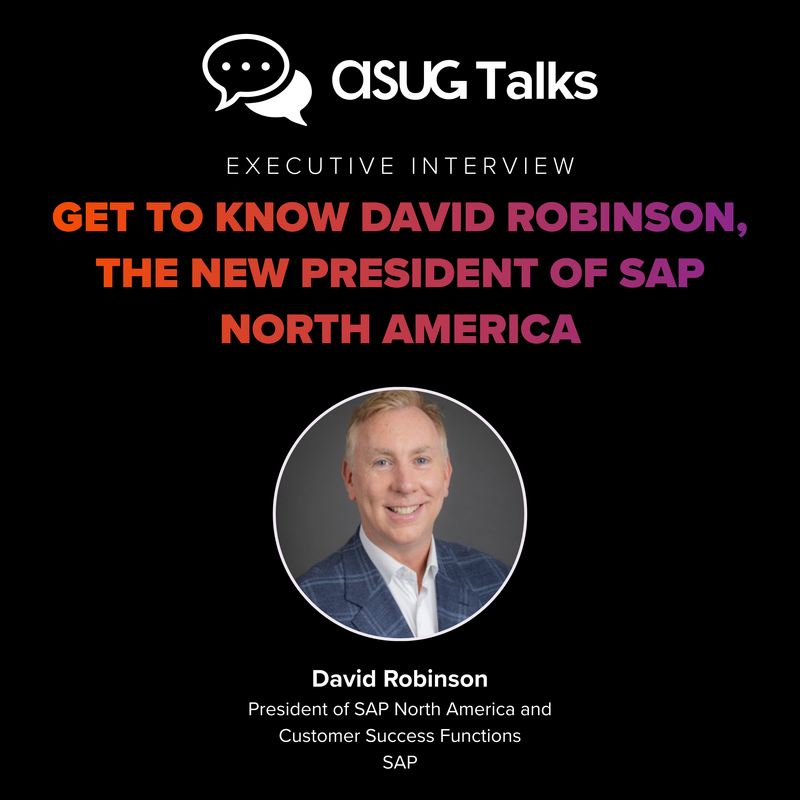
Log in to save this article and keep your favorite resources in one place.
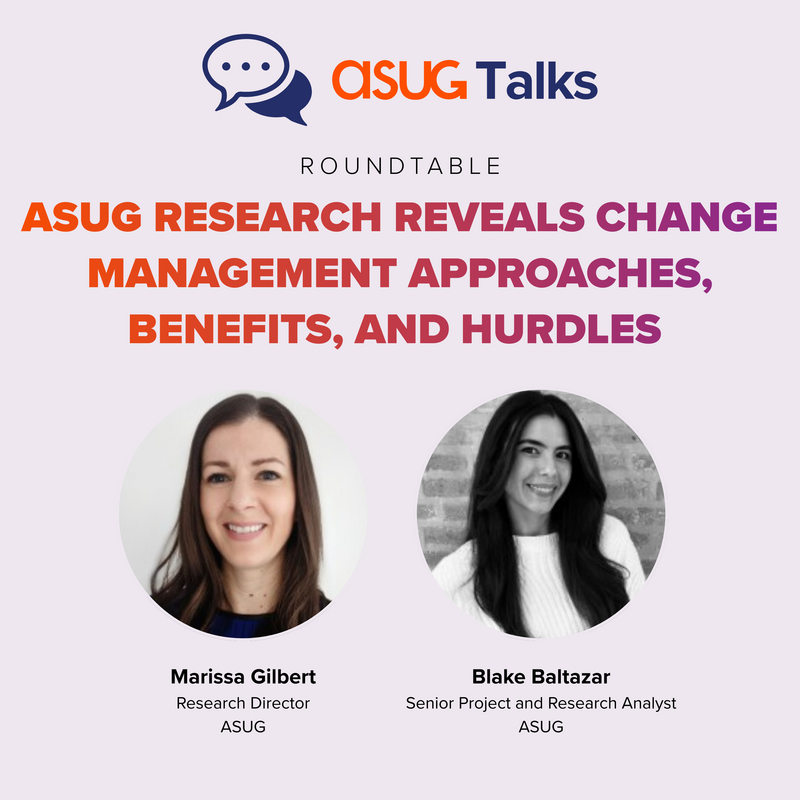
Log in to save this article and keep your favorite resources in one place.
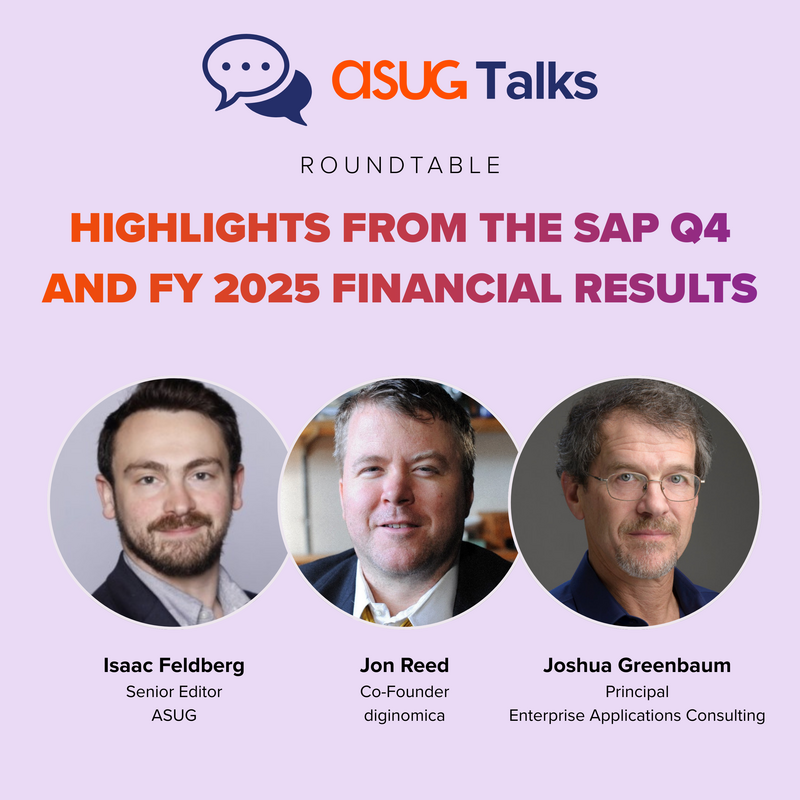
Log in to save this article and keep your favorite resources in one place.
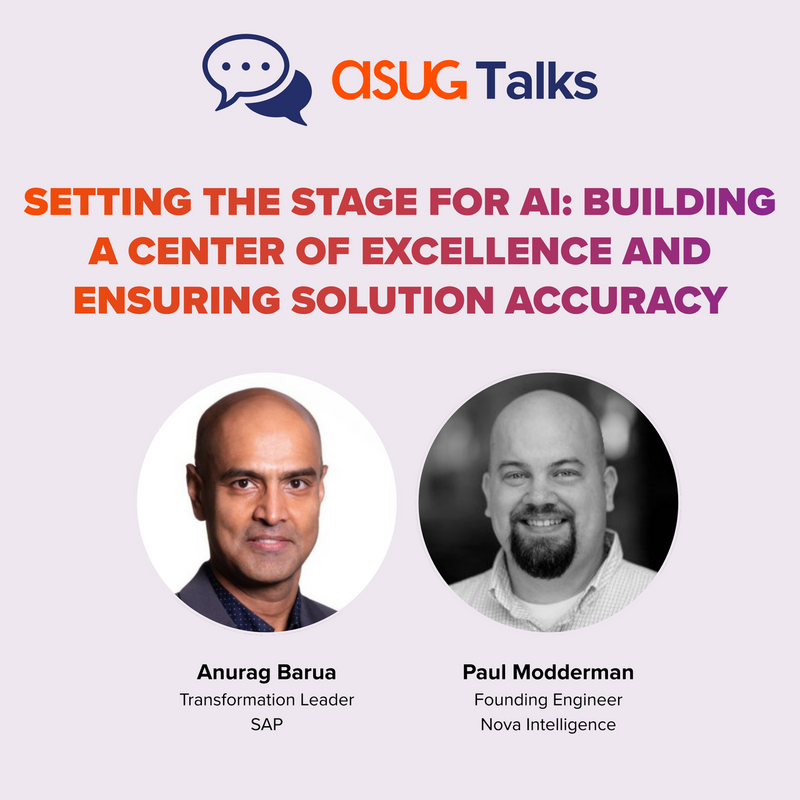
Log in to save this article and keep your favorite resources in one place.



